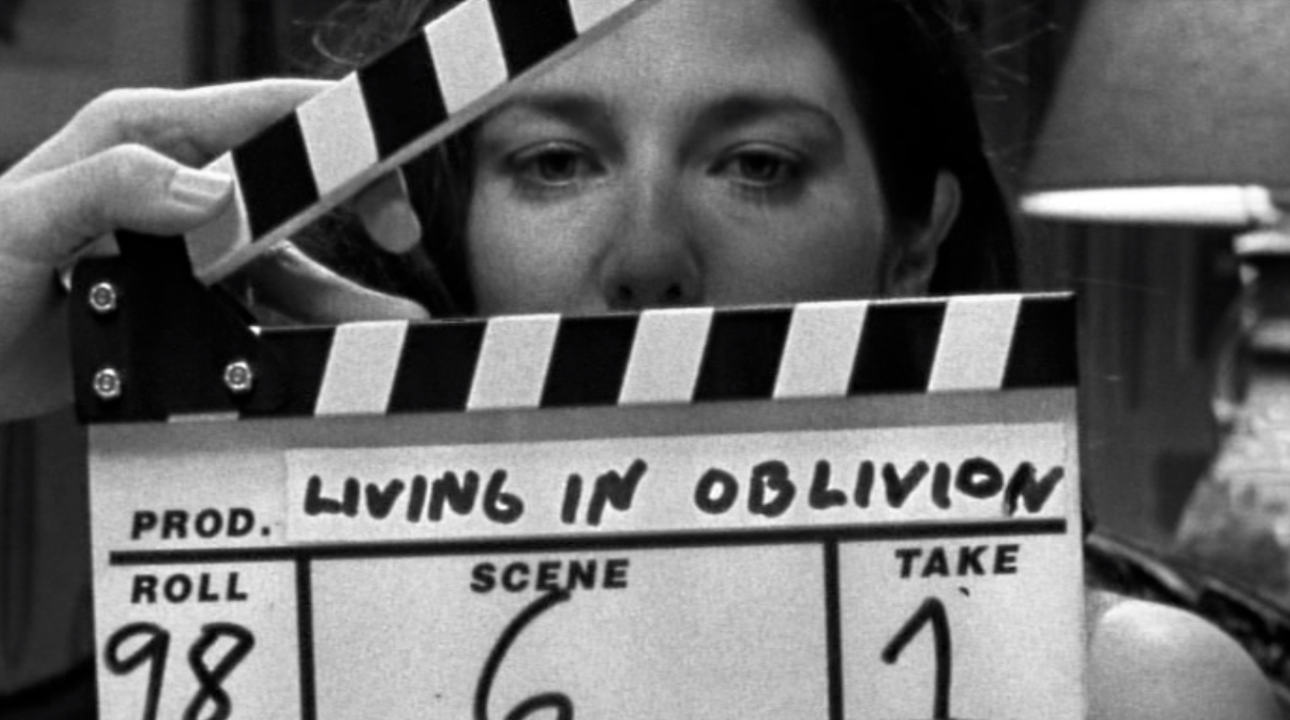The 90s. Arguably the time when indie filmmaking was at its peak definition of “indie,” in terms of major Hollywood actors suddenly wanting to get in on the action post-Reservoir Dogs in the hope of solidifying their acting credibility away from blockbuster affairs. With director Nick Reve (Steve Buscemi, looking as Jordan Catalano as he can) behind the camera, the cast and crew are convinced that their integrity can only skyrocket after enduring the lack of amenities of this low-budget affair.
In the lead role is Nicole (Catherine Keener, in one of her first indie films), riding off the cachet of her nude shower scene in a recent Richard Gere movie. This detail alone should give some insight into just how much an indie can be as superficial in its attempt at garnering headlines as a “major motion picture.” Directed by Tom DiCillo, himself an indie director extraordinaire, Living in Oblivion gives us many meta plotlines, including that of Chad Palomino (James LeGros), a “big deal” star who hates doing “Hostess Twinkie” shit–a.k.a. fluff movies–and wants to work on “honest,” “gritty” movies like the ones Nicke makes. To prove something about the soundness of his resume, Chad is sure to inform Nick that in his next movie, “I play a serial killer who shacks up with Winona Ryder.”
Chad’s diva antics on the set, however, only further drive Nick to question if he has the personality for the business. In fact, self-doubt seems to pervade just about everyone except Chad, with Nicole convinced she’s only been hired by Nick because of her tits and Wolf, his cinematographer, too emotional to handle much of anything, least of all the spoiled milk he’s been cutting his coffee with and that the craft service team was too apathetic to concern itself with.
Overtly parodying Brad Pitt in his one-off indie route in Johnny Suede, another DiCillo movie starring Catherine Keener prior to Living in Oblivion, Chad’s increasingly bizarre scene ideas are accommodated every time by Nick, hoping desperately to get some publicity for the movie. That Chad has already slept with and been rebuffed by Nicole the same morning only adds to the tension of yet another scene, each one seeming to present the director with new and unprecedented challenges in terms of being able to complete it. With his own feelings for Nicole clouding his judgment in the second segment, a fight between Chad and him ensues after Chad shouts, “I only agreed to do this movie because I heard you were friends with Quentin Tarantino.” The insult doesn’t fly, and Nick famously throws his words back in his face by calling him a “Hostess Twinkie motherfucker.”
To compound the indie sendup factor, Living in Oblivion is divided into three segments–all of which are dream sequences (though the third part being real or not is left to the viewer’s discretion) of one of the members of the project. After all, it’s no coincidence that Nick’s last name is Reve, which translates to dream in French. Yet when filming the actual dream sequence of the film in the third segment of Living in Oblivion, the uncooperative dwarf, Tito (Peter Dinklage), further forces Nick to call into question his abilities as Tito goes off on him for the stupidity of thinking that an audience will instantly recognize that Nicole is having a dream just because a dwarf is in the scene. Meanwhile, the sudden presence of his kooky and semi-senile mother, Cora (Rica Martens)–who previously appeared in the first segment as the actress playing Nicole’s mother–heightens the shitshow perspective of the viewer.
As Wolf’s sensitivity reaches an all-time high upon being broken up with by the first assistant director and the smoke machine becomes either too unnoticeable or too noticeable in its participation in the dream shot, Nick feels on the verge of tossing the entire project out. That Living in Oblivion is one of the most autobiographical films DiCillo has ever put out is encapsulated in the exchange between Nick and the driver taking him to the set in something resembling a beat-up station wagon. He asks, “How’d you get into cinematography?” Nick returns, “I’m not the cinematographer…I’m directing this movie.” That DiCillo began his own career as a DP, and has more credits under his belt in this role than in that of director, is telling that perhaps he, like Nick, has never found the stress in relation to the reward of helming a movie to be quite worthwhile. Yet he keeps doing it. If Nick’s own fantasy in the third section is any indication of why, it’s to prove to everyone who ever said he couldn’t that, well, he can.
And so, in addition to both types of filmmaking–blockbuster and indie–being ultimately a bid for glory and accolades, Living in Oblivion confirms that the statement, “Anything that can go wrong will go wrong,” is far more applicable to a movie with a shoestring budget. In short, it’s a derisive love letter to being “independent.”





















